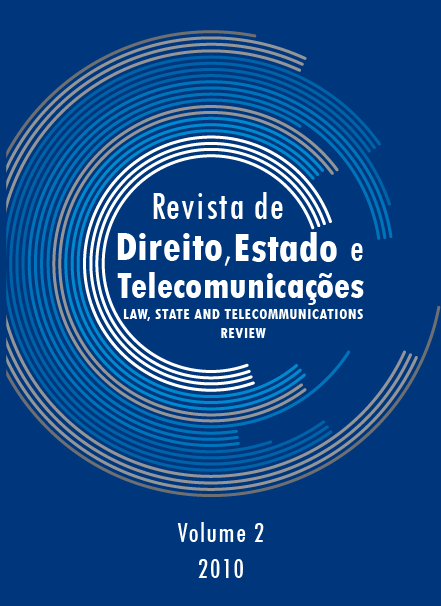Legal impacts of the concept of entrepreneurship on the level of normative regulatory concentration in the telecommunication sector: the Actium case
DOI:
https://doi.org/10.26512/lstr.v2i1.21686Keywords:
entrepreneurship, freedom of trade, competition law, Actium case, BrazilAbstract
This work addresses the interaction between legal regulation and the concept of entrepreneurship by analyzing its institutional meaning and verifying the impact of its use as a reason in a case from the telecommunication sector, the so-called “Actium” case. The case refers to a request for authorization to provide a telecommunication service, rejected by the National Telecommunications Agency as it ruled there was no regulatory support for that purpose. This article is divided in four topics: in the first part, we demonstrate that the legal regulation for a certain activity varies according to the applicable level of normative and operational regulatory concentration. This concept presented by Herren Aguillar refers to the interpretation of the State regulatory activity as a spectrum of possible ways of acting, varying between opening normative spheres to private actors and State intervention. In the second part, the functional elements of the entrepreneurial phenomenon as organized by Michael Peneder are presented, and connected to risk bearing, market coordination, technology diffusion, innovation and so forth. We demonstrate they are legally relevant as related to freedom of trade and commerce and competition law principles. Then, we describe the relevant facts of the “Actium” case, and analyze the legal consequences of using the concept of entrepreneurship to the case, especially to the meaning of the equal protection of law in this context. Finally, we conclude that the concept of entrepreneurship is legally relevant, and its use may impact the level of normative regulatory concentration applicable to a given telecommunication service.
Downloads
References
BAUMOL, William J. Entrepreneurship: productive, unproductive, and destructive. In: Journal of Political Economy, Vol. 98, n. 5, 1990. p. 893-921.
CANTILLON, Richard. Essays on the nature of commerce in general. New Brunswick, New Jersey: Transaction Publishers, 2001.
CASSON, Mark. The entrepreneur: an economic theory. 2ª ed., Cheltenham, UK: Edward Elgar Publishing, 2003.
GRAU, Eros Roberto. A ordem econômica na constituição de 1988. 11ª ed. São Paulo: Malheiros, 2006.
HAYEK, F.A. The use of knowledge in society. In: American Economic Review. Vol. 35, n. 4, setembro, 1945. p. 519-530.
HÉBERT, Robert F.; LINK, Albert N. In the search of the meaning of entrepreneurship. In: Small Business Economics. Vol. 1, n. 1, 1989. p. 39-49.
HERREN AGUILLAR, Fernando. Controle social de serviços públicos. São Paulo: Max Limonad, 1999.
KIRZNER, Israel M. Competition and entrepreneurship. Chicago: University of Chicago Press, 1973.
KNIGHT, Frank Hyneman. Risk, uncertainty and profit. New York: Cosimo, 2005.
MARQUES NETO, Floriano Peixoto de Azevedo. Regulação estatal e interesses públicos. São Paulo: Malheiros, 2002.
MARSHALL, Alfred. Principles of Economics. New York: Cosimo, 2009.
PASOUR, JR., E. C. Rent Seeking: Some Conceptual Problems and Implications. In: The Review of Austrian Economics. Vol. 1, n. 1, 1987. p. 123-143.
PENEDER, Michael R. The meaning of entrepreneurship: towards a modular concept. In: WIFO Working Papers, n. 335. Viena: WIFO, Março de 2009.
STAM, Erik. Entrepreneurship and innovation. In: STAM, Erik; NOOTEBOOM, Bart (eds.). Micro-foundations for innovation policy. Amsterdam: Amsterdam University Press, 2008. p. 135-172.
SUNDFELD, Carlos Ari. Meu depoimento e avaliação sobre a Lei Geral de Telecomunicações. In: Revista de Direito de Informática e Telecomunicações, v. 2, 2007. p. 55-84.
WENNEKERS, Sander; THURIK, Roy A. Linking entrepreneurship and economic growth. In: Small Business Economics, Vol. 13, 1999. p. 27-55.
Downloads
Published
How to Cite
Issue
Section
License
By submitting this paper to the Law, State and Telecommunications Review,
I hereby declare that I agree to the terms of the Creative Commons Attribution 4.0 International (CC BY 4.0).


